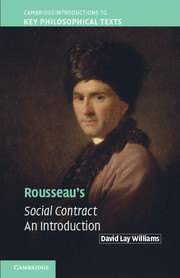Chapter 4 - Book IV
Published online by Cambridge University Press: 05 June 2014
Summary
Overview
The final nine chapters of the Social Contract have two broad and related purposes: legislating and then maintaining the general will. Chapters One through Three speak to the practical issue of how a people might perform their duties as legislators. In Rousseau’s vocabulary, they outline how the sovereign effectively legislates the general will. It is one thing to say that the people must agree on the general will for them to legislate. It is quite another to make it happen in the real world, since as Rousseau’s great admirer, Immanuel Kant, once lamented, “Nothing straight can be constructed from such warped wood as that of which man is made.” Despite this, Rousseau is persuaded that measures can be taken to improve the likelihood of the people legislating the general will, including virtue (SC, 4.1.1) and supermajoritarianism (SC, 4.2.11).
The final substantive chapters of the Social Contract are dedicated to a discussion of the Roman Republic, often cited by Rousseau as an inspiration and model for his political theory. Here he discusses and adapts several of its institutions to his own purposes – primarily to maintaining the integrity of the general will. The Comitia and Tribunate combine as institutional bodies that might represent the general nature of the general will, insofar as the Comitia and Tribunes combine to represent the two classes of citizens that have historically combined to destroy all polities – namely, rich and poor. Rousseau suggests in these pages that representing both in a reasonable way might help maintain the general will. His chapter on the dictatorship speaks of the need to preserve the general will through times of crisis. His chapter on censorship addresses institutional measures by which public virtue might be maintained. And finally, his discussion of the civil religion in Chapter Eight offers spiritual reasons to inspire citizens to civic duty, while also keeping the ominous threat of external religious authorities at bay, since they pose their own threats to the general will. He concludes in Chapter Nine by suggesting that the general will would ultimately also have to be protected in the context of external threats in the international sphere.
- Type
- Chapter
- Information
- Rousseau's Social ContractAn Introduction, pp. 156 - 215Publisher: Cambridge University PressPrint publication year: 2014



